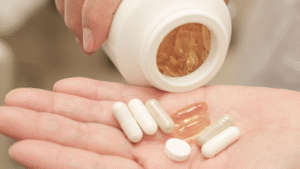Table of Contents
Navigating Pregnancy Diet Guilt When Your Partner Has Strong Opinions
Pregnancy is a time of incredible change and responsibility, and for many women, that includes making thoughtful food choices for their growing baby.
But what happens when a partner becomes overly critical of what you eat? It can lead to guilt, resentment, and unnecessary stress, even when you’re already putting in a huge effort to stay healthy.
One mom-to-be recently shared her frustration about being criticized for eating rice and enjoying meals out with loved ones, despite the fact that most of her meals were home-prepped, full of vegetables, lean proteins, and whole foods. Like so many women, she felt that her partner’s expectations for a “perfect diet” dismissed her effort, culture, and mental well-being.
What Really Matters in a Pregnancy Diet
The good news is that research shows babies are remarkably resilient. According to a review in the Australian and New Zealand Journal of Obstetrics and Gynaecology (2017), a generally balanced diet that includes fruits, vegetables, whole grains, lean proteins, and healthy fats is ideal, but occasional indulgences do not harm the baby.
In fact, most women naturally adapt their eating to support their needs during pregnancy, even without extreme restrictions. A 2022 review in the International Journal of Environmental Research and Public Health highlights that while nutrient quality is important, meeting overall calorie and protein needs is equally essential to support fetal growth.
Restricting entire food groups or avoiding all processed foods isn’t necessary, especially when it leads to stress or social isolation.
Why Overly Restrictive Eating Can Backfire
A partner who pressures a pregnant woman to follow a “perfect” diet may not realize that pregnancy is about balance, not perfection. Feeling guilt over occasional restaurant meals or comfort foods can create unnecessary stress, which isn’t good for mother or baby.
Emotional well-being is an important part of prenatal health, and eating familiar cultural foods and sharing meals with loved ones can provide comfort and connection.
Healthcare professionals emphasize that the baby will take the nutrients it needs from the mother’s stores, especially if she’s taking a prenatal vitamin. The mother’s overall health and nutrient reserves matter, but this doesn’t mean every single meal must be “clean.”
The Role of Supplements in Pregnancy
Even with a balanced diet, many pregnant women benefit from supplements to fill nutritional gaps. A high-quality prenatal vitamin is widely recommended because it provides folic acid, vitamin D, iodine, and other key nutrients.
If you’re using a gummy prenatal, be aware that most do not include iron, which is crucial for preventing anemia during pregnancy (Wiley, 2017).
Some women also consider adding a DHA supplement, an omega-3 fatty acid that supports the baby’s brain and eye development. Always discuss any supplement changes with your healthcare provider to make sure it’s right for you.
Food Is About Nourishment and Connection
Pregnancy is not just about macronutrients and vitamins. Food is also deeply tied to culture, joy, and community. Many women grow up with staple dishes that bring comfort, and it’s okay to enjoy those foods while still making healthy choices most of the time.
Occasional takeout or a bowl of noodles doesn’t undo the benefits of the many nutrient-dense meals you prepare.
Focusing on variety, getting enough protein and iron, staying hydrated, and taking your prenatal vitamins can go a long way toward supporting both you and your baby. Social meals and cultural foods can absolutely be part of a healthy pregnancy.
A Word From Vitamins For Woman
You are doing enough. Pregnancy is hard enough without added guilt over every bite of food. If you’re eating mostly balanced meals, staying nourished, and taking your prenatal vitamins, you’re already doing a wonderful job for your baby.
Remember, health is about more than just nutrients. It’s also about mental well-being, cultural traditions, and enjoying this special time. If you’re considering adding supplements like iron or DHA, talk to your healthcare provider and check out our trusted recommendations through our affiliate links to support your pregnancy journey.
Wiley, A. S. (2017). Does Folic Acid Supplementation Prevent Neural Tube Defects? Australian and New Zealand Journal of Obstetrics and Gynaecology, 57(5), 528–529. https://doi.org/10.1111/ajo.12523
MDPI. (2022). Maternal Diet and Nutritional Requirements in Pregnancy. International Journal of Environmental Research and Public Health, 19(10), 5849. https://doi.org/10.3390/ijerph19105849












